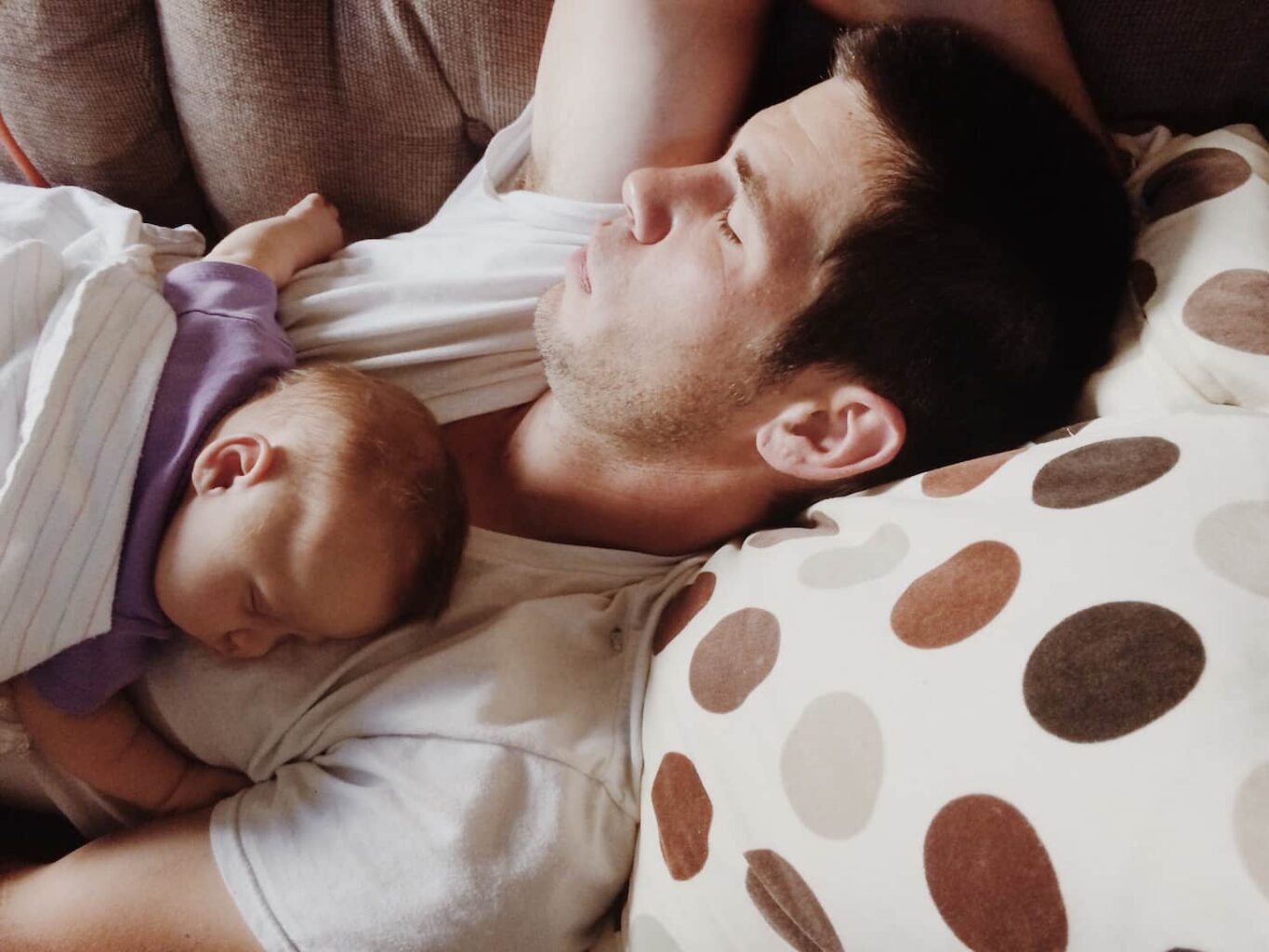Naps are crucial to a baby’s healthy development. Allowing time for babies to close their eyes gives them a chance to recharge and rest. Growing takes a lot of energy, and naps give a child the essential time they need to recover.
If the baby naps too late, this will impact their bedtime and can lead to disrupted sleep. The time between a baby’s last nap and bedtime varies depending on their age – younger babies will only need 1 to 2 hours, while older babies will need over 2 hours.
While naps are essential to a baby’s schedule, it’s important to time these correctly. We will cover what time parents should schedule a baby’s nap, how late to let a baby nap, when we should wake the baby from their nap, and how long the baby should stay in their crib after their nap.
Want to know more about napping babies? Read on for more information.

What Time of Day Should the Last Nap Start and End?
The timing of the last nap of the day depends on the baby’s age. The last nap should be about 45 minutes to an hour long and 1 to 2½ hours before bedtime so the baby can still sleep at night. A good nap time window is between 4:00 to 6:30 p.m. The exact time will vary depending on the baby’s age.
From 3 months, a baby will be more active and awake – but they still need a nap schedule. It’s important to time these naps, so they don’t impact nighttime sleep. Below are some guidelines for last nap times for babies in the first few months:
- 2 Months – Nap starts at 5:30 p.m. till 6:30 p.m. Bedtime 1 to 2 hours later.
- 3 Months – Nap starts at 4:30 p.m. till 5:30 p.m. Bedtime 1½ to 1 ¾ hours later.
- 4 Months – Nap starts at 4:00 p.m. till 5:00 p.m. Bedtime 2 to 2¼ hours later.
- 5 Months – Nap starts at 4:00 p.m. till 5:00 p.m. Bedtime 2 to 2½ hours later.
Once a baby reaches six months, we can drop to three naps a day. This is an excellent stage to incorporate a set napping schedule. A consistent routine will help the baby sleep better.
A good time to end naps after the baby is six months old is around 4 pm. After that, we can gradually increase the time our child awakens after their nap to suit their increased energy.
Want to know more about a baby’s nap schedule? Read this terrific article: Are 30-Minute Naps Enough for a Baby? The answer will surprise you!
Should I Let My Baby Nap After 4 or 5 pm?
Parents should generally only let their baby nap after 5 pm until 4 months old. By six months, a baby should be finishing their final nap by 4 pm so that it doesn’t interfere with bedtime.
If a baby struggles with early nap times, consider moving their bedtime earlier to prevent overtiredness. However, don’t be too concerned if you aren’t constantly hitting this nap schedule; babies may not settle into their sleep schedule until 4 to 5 months old.
The importance of not letting a baby nap late in the day is it helps them maintain an appropriate bedtime. No matter what age we are, napping late in the day will disrupt sleep at night.
Sleeping for long periods at night is essential to a baby’s development, so we want to protect this as much as possible.
Are you interested in the best place for your baby to sleep? Read this great article: Can A Baby Sleep in Their Own Room from Birth? We’ve got all the guidelines from the American Academy of Pediatrics outlined for you.
When Should I Wake My Baby From a Late-Day Nap?
Parents should wake their baby up from a late-day nap when the baby has been asleep for more than 45-minutes to 1 hour. This is to prevent the baby from sleeping too much – meaning they will be too awake to fall asleep at bedtime.
We all know the golden rule is never waking a baby, but this might be necessary when parents start sleep training.
If parents know their baby will nap for hours on end, it’s worth gently waking them after 45 minutes so they can learn the last nap is short. This will maintain some sleep pressure so they can have a sound sleep during the night.
Being consistent with bedtimes will help the baby to settle into their nap schedule. For this reason, it’s good to make sure the child is drifting off at night successfully – which is why parents may have to wake them from a nap occasionally.
If you are interested in sleep training your baby, read this guide we wrote: How to Sleep Train Your Baby: a Complete and Helpful Guide. It’ll walk you through all the steps and show you where you can make personalized adjustments to help your baby.
How Long Should I Let My Baby Lay Awake in Crib After Nap?
Once a baby wakes from their nap, parents can leave them awake in their crib for 5 to 10 minutes. This time can be beneficial to their development. However, parents must never leave their young babies alone in a crib for too long, as this can result in health issues.
Leaving a baby post-nap in their crib for a brief time is a terrific way to encourage independence. It will allow them time to be comfortable in their own company and helps build the skills needed for settling on their own.
Obviously, we don’t want to leave a sleepy baby in their crib too long, just in case they drift off again. That would mess with the whole sleep schedule and throw off the day.
If you’d like to know more about the potential health issues from leaving a baby in the crib too long, some of the most common issues relate to crying babies who vomit and/or soil their pants. You can read more details in our article, How Long To Let Baby Cry Before Picking Them Up?

Key Takeaways and Next Steps
Bedtime should be between 1 to 4 hours after nap time, depending on the baby’s age. It’s essential to allow enough time between the end of the nap and the start of bedtime so the baby doesn’t get overtired.
Parents will want to avoid having late nap times and ensure they don’t start too early. Working based on 45-minute naptimes is ideal for promoting healthy sleep.
If a baby likes to sleep longer during naps, waking them up is okay to keep them short. It’s also okay to allow babies a short time to be awake in their crib after a nap.
Allowing a baby to enjoy a short final nap will give them enough rest to avoid overtiredness but will protect the sleep pressure, which means you and the baby can have a good night’s sleep.
For parents who are interested in learning all the best sleep training methods, please read these informational articles we wrote:
- Sleep Training and Going Back To Work: 25 Things to Know.
- Do You Feed Baby When Sleep Training? (Plus 11 Tips).
- Guide: How to Maintain Sleep Training When Baby Is Sick.
- Sleep Training: Light On or Off? 5 Things to Know.
They’re all great resources. However, if they aren’t what you need, feel free to use our search function (it’s up by the menu) to find what you need. If we haven’t covered your question already, use our contact page to shoot us an email. We’d love to answer your question and get an article prepped for other parents like you.
Resources
Learning about parenting or sleep training techniques is important to learn from various reputable sources. These are the sources used in this article and our research to be more informed as parents.
- Baby Napping Close to Bedtime and How to Do It Right. (2020, May 28). Dreamland Baby. https://dreamlandbabyco.com/blogs/news/baby-sleep-napping-close-to-bedtime.
- Johnson, N. F. A. L. S. C. (2019, November 18). How Down Time in the Crib Can Be Bad For Your Baby’s Sleep. The Baby Sleep Site – Baby / Toddler Sleep Consultants. https://www.babysleepsite.com/baby-sleep-patterns/baby-sleep-crib-down-time/.